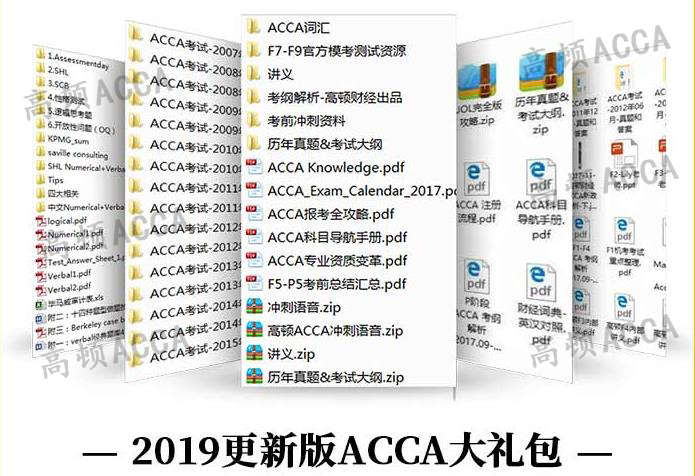如何考好F1?ACCA F1的复习重点是什么呢?
- 来源: 高顿ACCA
- 2019-03-27 13:48:18
- 责编: dgh
ACCA F1课程是ACCA的第一门考试课程,俗话说一个好的开始是成功的一半,考好F1至关重要,F1考好了不仅能奠定好的基础,而且还能给学员以充足的自信心。那么如何考好F1?ACCA F1的复习重点是什么呢?高顿ACCA小编再送一个2019年考试资料包,可以分享给小伙伴,自提,戳:ACCA资料【新手指南】+内部讲义+解析音频
要想复习好F1的课程需要首先了解F1的课程特点。和ACCA其他F阶段课程相比较,F1的课程呈现以下两个特点:
纯理论课程,几乎没有计算。
第二,ACCA*9门课程,内容较杂,几乎提到之后各科内容。
针对这样的课程特点,ACCA F1的复习重点应该在各个章节知识点和概念的理解上,课上中文理解,课下英文理解,双语对照,加强记忆。
给大家推荐一个已经考过ACCA的高顿学姐,关于ACCA任何不懂的事情都可以咨询她。不仅能解决ACCA考试问题,还有电子版ACCA试题和ACCA备考资料(点击下图领取):微信ID:ACCAmengyue
Mendelow:
Mendelow’s Matrix:Stakeholders&Power VS InterestHight power&high interest:key players
Hight power&low interest:keep satisfiedLow power&high interest:keep informed
Low power&low interest:minimal effortsAnthony:
Planning Level:Hierarchy层级(管理层)——STO战略(Strategic)规划(高级管理层:处理长期规划;关心公司发展方向、政策制定、危机处理)战术(Tactical)决策(中层领导:每年具体目标制定;关心如何达到企业目标的方法、资源的合理配置、创新)经营(Operational)管理(车间小组长:监管并参与实际生产;制定日常活动计划)Porter:
价值链value chain:
支持活动:基础设施、IT、HR、采购、财务
主要活动:进料inbound(receiving、warehousing、distribution)、加工(transforming)、给到客户(warehousing/distribution of finished goods)、市场/销售、售后服务五力竞争模型Five competence force:
Threat of new entrants新兴商品(进入市场的障碍:economices of scale规模经济、product differentiation产品区别化、good brand name&customer loyalty品牌与客户忠诚度、capital requirement资金要求、switching cost转化成本、access to distribution channels分销渠道、learning cureve advantage学习曲线优势)/substitute替代品的威胁力、customers客户/suppliers供应商的议价能力、competitive rivalry同行业的竞争力Generic Strategies:
Cost leadership成本领先:低成本生产商
Differentiation差异领先:unique[*{3}*]
Focus:cost focus只注重部分市场;分类:成本中心/differentiation focus差异中心Schein:
Determinanta of organization culture组织文化的决定因素:
组织文化的决定性因素(三个层级)P160
*9层级:Artifacts——可看得见的部分,包括工作行为、态度第二层级:Values&Beliefs——潜在隐藏部分,包括目标、战略第三层级:Assumptions——很难感受到,包括想法、感受Handy:
Organization culture组织文化的分类:
组织文化的分类:权力型、角色型、任务型、个性型P162权力型Power culture:保持绝对管理权;适用于简单/企业家结构组织——Zeus角色型Role culture:按职位划分,变化/晋升缓慢;适用于官僚主义组织;适用于稳定、结构大的组织如政府机关——Apollo任务型Task culture:注重任务完成结果的好坏、完成任务;适用于项目团队如matrix structure(短期、一次性),根据结果——Athena个性型Person culture:满足某一个体的要求;适用于——DionysusHofstede:
International culture国际文化五大差异维度:
权力距离power distance:上下级之间的关系(中方比较大,西方比较小)个人主义&集体主义individualism&collectivism:中国崇尚集体、西方注重个人男性化&女性化社会*masculinity&femininity:男性与女性之间的区别低不确定性&高不确定性规避:uncertainty avoidance短期取向&长期取向:Long&short term orientationLeader VS Manager区别:Kotter&Bennis
Kotter:
管理Mngt应对复杂(Complexity—process&structure、analysis&control)情况,领导Leadership应付变化(change)Bennis:
管理Mngt注重内控系统(system)和短期short term,领导注重人们(people)和长期long term管理学代表人物及理论内容:
Scientific/classical theory of management科学管理——Fayol,TaylorThe human relations school人际关系学说——MayoFunctions of a manager管理者的职能——MintzberDruckerFayol:
管理五大职能:five functions of management—POCCCPlanning(determine objectives、strategies、policies、programmes&procedures for achieving the objective、the org&sub-units确定发展目标、策略、流程等)Organizing(establish structure of task、delegate authority to carry out tasks、providing systems of inf.&communication for co-ordination of activities建立组织结构、下放权力)Commanding(giving instructions下达命令)Coordinating(harmonizing the goals and activities of individuals and groups within the organization个人目标与组织目标相统一)Controlling(measuring&correcting评估和纠正)后人/现代管理学增加两点:Motivating(激励)、Communicating(沟通)Taylor:
科学管理:现代科学管理之父、科学管理的原理(4个)和方法(4个)、计件工资piecework Principles科学管理的原理:
The development of true science of work发展真正的科学(收集所有知识并明细化分)The scientific selection&progressive development of workers科学挑选员工并培训(提供最合适的工作)The applications of techniques to plan制定科学的工作方法(评估并控制工作、为了*5产能)The constant&intimate co-operation员工和管理层的合作Techniques科学管理的方法:
Work study techniques研究工作方法(分析任务、找出最有效的方法、不准出错)Planning&doing were separated规划人和实施者分离Jobs were micro-designed工作分解详细(简单、单一的任务)Workers were paid incentives员工薪水(激励作用)Mayo
Human Relation School人际关系学说:注重social relationshipsHawthorne实验(宣泄效应、发泄不满、与领导层沟通交流—心情变得舒畅也感觉到了管理层的关心、生产效率提高)Marslow,Hertzberg
后人际关系学说(Neo-human relations)
——an open,dynamic organism with human psychological needs of growth,challenge,responsibility and fulfillment岗位中强调成长、责任感、成就感也能带来绩效的上升Peter Drucker
Management Process管理过程:
注重management concepts and practices、a manager or a business has one basic functioneconomic performance;管理过程的步骤(5步)管理过程的步骤:为组织设立目标、为目标工作、激励员工、工作评估衡量、培训员工Drucker认为:企业管理最重要的责任(overriding responsibility):经济效益(economic performance)Mintzberg
Manager roles管理者的角色(3大角色、10小角色)3大角色:interpersonal人际关系角色、informational信息角色、decisional决策角色10小角色:3、3、4人际关系:figurehead首脑、leader领导者、liaison person联络人信息角色:监管者monitor、发言人spokesman、信息传播者disseminator决策角色:企业家entrepreneur、资源分配管理recourse allocation administrator、商议者negotiator、传递者(解决问题者)mediator观点:管理者不能总是作为计划者、管理者工作乱且不连续、管理者每天有职责要履行等Leadership领导能力理论三大学派:Trait、Style、ContingentTrait:Certain characteristics common to successful leaderStyle学派代表人物:Ashridge—MGM分类、Blake&Mouton—MGM GridContingent学派代表人物:Fiedler—PDMs&PCMs,Adair—ACLHelfetz的Dispersed Leadership观点
Style:代表人物(Ashridge—MGM分类、Blake and Mouton—MGM Grid)Ashridge:
Management College Model领导分类4类
Tells(autocratic):领导做所有决策、按照交代的做——专制Sells(persuasive):领导做所有决策、但员工需被激励Consults(咨询):领导考虑下级的观点、最后还是领导决策Joins(democratic):领导和下级一起做决策、consensus达成一致Blake and Mouton:
Management Grid方格理论(关心工作、关心员工)、*5个特殊点1.1 Impoverished:双low型:对工作、员工都不关心9.9 Team:双high型:
5.5 Middle Road(dampened pendulum):对工作、员工平衡关心1.9 Country Club:对员工关心、不关心工作
9.1 Task management:对工作关心、对员工不关心Contingency:根据变量而变化、*代表人物(Fiedler—PDM&PCM,Adair—ACL)Fiedler:

Nature of leadership研究领导力的本质——部分因为态度attitude,部分取决于环境situation领导的分类:PDMs(和下级保持距离、注重工作)、PCMs(和下级亲近、关系好)影响领导有效的因素:上下级之间的关系、工作任务的结构清晰度、领导拥有的权利如何高效文章来源公众号:ACCA学习号(ID:studyacca)领导的情形:员工敬爱爱戴领导、任务结构清晰、领导权利至高Fiedler建议:PDM(structured)无论情形好坏都OK、PCM只有在favourable的时候才OKJohn Adair:
行为中心领导(ACL)模型(建立在情况或功能之上、注重领导做了什么)三个变量:任务需求、组员个人需求、小组需求Effective leadership is a process of identifying and acting on that priority,exercising a relevant cluster of roles to meet the various needs.(有效领导需考虑以上三个变量)任务需求:initiating、information-seeking、diagnosing、opinion-seeking、evaluating、decision-making(发起、信息寻找、诊断、意见寻找、评估、做决定)组员个人需求:goal-setting、feedback、recognition、counselling、training(建立目标、反馈、意识、讨论、培训)小组需求:encouraging、peace-keeping、clarifying、standard-seeking(鼓励、保持和睦、清晰化、标准寻找)步骤:定义任务、计划、概述、控制、评估、激励、组织、建立模版Heifetz:
Dispersed Leadership(组织中的任何一个人都可以发挥领导力和影响力管理者在团队建立和队员个人发展的作用:P352Belbin团队角色理论、Tuckman团队发展理论
Belbin
Team role theory团队角色理论:9大角色
*Plant:创造力creative、想象力imaginative、非正统unorthodox——解决难题——忽视细节,太全神贯注于高效的沟通*Resource investigator:外向extrovert、热情enthusiastic、善于沟通communicative——寻求发展机会、发展/加强联系——太过乐观、三分钟热度过去就失去兴趣*Co-ordinator(Chairman):成熟mature、自信confident、好领导a chair person——阐明目标、提升决策、好授权(管理层)——操纵、代表个人工作*Shaper:挑战challenging、动感dynamic、抗压力strive on pressure——有推动力和勇气克服障碍——激怒/挑衅他人、伤害感情*Monitor/Evaluator:冷静、战略型strategic、判断力强discerning——评估所有选择、准确评判accurate judgement——缺乏鼓舞他们的内驱力和能力,太过批判性*Team Worker:合作cooperative、温和、感知力强、老练——聆听、建立、防止摩擦、平息风波calm waters——在关键情况下犹豫不决、容易被影响Implementer(company worker):遵守记录、依赖性、保守、高效—把理想转换为现实——顽固的、对新的可能性反应迟钝Completer/finisher:勤勉、认真、焦虑——查处错误和纰漏,准时交付——过度担心、不远委任、吹毛求疵Specialist:专心single-minded、自启式self-starting、专注dedicated——提供少见的知识和技能——只对狭隘的前线有贡献、停留在学术性、忽略更大的蓝图Tuckman
Team development process团队发展理论:分4个阶段FSNP P355Forming:组建期、initial stage初期、introducing new ideas引进信理念、trying to find out each other相互认识和了解Storming:动荡期、growing stage成长阶段、openning conflict unavoided不可避免的明显冲突、加强相互信任Norming:规范期、mature成熟期、norms®ulations建立规范和规章制度Performing:执行任务
后来的补充:
Dorming:步入正轨后的骄傲自满,导致退步
Mourning/adjourning:衰退/休整期:group breaks up、回到forming stage*激励理论分类:内容理论、过程理论P366
内容理论:What motivates people?提供满足自己需求的方法Maslow
Hierarchy of needs需求层次理论:五个层次P367Physical生理需求:食物、住所
Saftety安全需求:安全、有秩序、可预测性、免受威胁Love/Social爱/社会需求:关系、感情、归属感Esteem尊重需求:独立、认可、地位、他人的尊敬Self-actualisation自我实现:实现个人的潜力只有当一个层次得到满足,才会有对下一层次的需求。
Maslow理论的局限性:P368
一个时期内的几个需求同时存在、不同需求不同人有不同的反应、需求递延(Deferred needs、suffer)、层级的实证检验很难、层级反映美国和英国的文化价值,也许不适用于其他国家文章来源公众号:ACCA学习号(ID:studyacca)Hertzberg
Two-factor theory双因理论P368
理论基础:两个需求——Hygiene factors&Motivator factors保健因素&激励因素避免不愉快的需求:保健因素:预防员工的不满(公司政策和治理、工资、监督的质量、人际关系、管理风格、工作环境、工作保障、身份地位)个人成长与实现的需求:动力因素(状态、提升、同事和管理者的认可、职责、挑战性工作、成就感、培训、工作中的成长与发展、身份地位)Herzberg建议三种工作设计用来提升工作满意度:扩大就业job enlargement、工作轮换job rotation、工作丰富化job enrichmentHerzberg理论的局
限性:动力因素提升生产率很难衡量、样本的量不充足、限制性的文化背景(西方)P369、工作满足感对工作表现的影响无必然关系过程理论:How can people be motivated?如何激励员工P369Vroom
Expectancy theory期望理论:对结果的期待;激励可以被评估和估量公式:F=V*E
F:motivation force
V:valence(preference)效价;由正数desired、负数avoid、零indifference表示E:expectancy;0表示没有机会-1表示肯定之间的任何数字Valence:正/负/零、达到目标后对个人的意义、目标的价值Expectancy:自我评估实现目标的概率有多少
McGregor:
X理论和Y理论——两个极端假设P370
X理论:大多数人懒惰、不喜欢工作dislike、需要control——人之初、性本恶因此大多数人是被强迫、控制、指挥甚至胁迫的——管理者软硬兼施Y理论:大多数人勤劳、喜欢工作not dislike——人之初、性本善管理者应善于咨询并促进,使用正反馈、挑战、职责作为激励因素Hertzberg:
三个方法、提高岗位设计、使工作对员工来说更有趣Job enrichment:丰富化、扩大岗位职责、工作宽度、提高工作挑战性(vertical)Eg:给员工足够的自由,考虑如何完成任务;鼓励员工参与规划决策;定期给员工反馈Job enlargement:扩大化、增加工作的环节和步骤(horizontal)Job rotation:轮换制、员工岗位轮换
Honey&Mumford
学习风格4种P383 TRAP
Theorists理论主义者:understand basic principles—清晰计划且有结构、分析、喜欢老师和他们沟通理论和分析Reflectors反射主义者:work at his own pace(自学)、总结结论、速度慢、不参与课堂学习Activists积极者:处理practical/active problem、不爱理论—喜欢学习工作经验、乐于参加、接受压力、比较激进Pragmatists实用主义者:只学习解决目前实际有关问题的方法、善于通过在职训练学习新技术、目的性强Kolb:
Learning Cycle学习流程——学习周期P384
又称:Experimental Learning Cycle、learner in an active problem-solving role、self-learning、学习周期:
Having an experience(Act)
Observation&Reflection(Analyse Action)Formation&Abstract/Concepts&Generalization(Suggest Principles/Abstract)Applying&Testing(Apply Principles/Plan)
要想复习好F1的课程需要首先了解F1的课程特点。和ACCA其他F阶段课程相比较,F1的课程呈现以下两个特点:
纯理论课程,几乎没有计算。
第二,ACCA*9门课程,内容较杂,几乎提到之后各科内容。
针对这样的课程特点,ACCA F1的复习重点应该在各个章节知识点和概念的理解上,课上中文理解,课下英文理解,双语对照,加强记忆。
给大家推荐一个已经考过ACCA的高顿学姐,关于ACCA任何不懂的事情都可以咨询她。不仅能解决ACCA考试问题,还有电子版ACCA试题和ACCA备考资料(点击下图领取):微信ID:ACCAmengyue
Mendelow:
Mendelow’s Matrix:Stakeholders&Power VS InterestHight power&high interest:key players
Hight power&low interest:keep satisfiedLow power&high interest:keep informed
Low power&low interest:minimal effortsAnthony:
Planning Level:Hierarchy层级(管理层)——STO战略(Strategic)规划(高级管理层:处理长期规划;关心公司发展方向、政策制定、危机处理)战术(Tactical)决策(中层领导:每年具体目标制定;关心如何达到企业目标的方法、资源的合理配置、创新)经营(Operational)管理(车间小组长:监管并参与实际生产;制定日常活动计划)Porter:
价值链value chain:
支持活动:基础设施、IT、HR、采购、财务
主要活动:进料inbound(receiving、warehousing、distribution)、加工(transforming)、给到客户(warehousing/distribution of finished goods)、市场/销售、售后服务五力竞争模型Five competence force:
Threat of new entrants新兴商品(进入市场的障碍:economices of scale规模经济、product differentiation产品区别化、good brand name&customer loyalty品牌与客户忠诚度、capital requirement资金要求、switching cost转化成本、access to distribution channels分销渠道、learning cureve advantage学习曲线优势)/substitute替代品的威胁力、customers客户/suppliers供应商的议价能力、competitive rivalry同行业的竞争力Generic Strategies:
Cost leadership成本领先:低成本生产商
Differentiation差异领先:unique[*{3}*]
Focus:cost focus只注重部分市场;分类:成本中心/differentiation focus差异中心Schein:
Determinanta of organization culture组织文化的决定因素:
组织文化的决定性因素(三个层级)P160
*9层级:Artifacts——可看得见的部分,包括工作行为、态度第二层级:Values&Beliefs——潜在隐藏部分,包括目标、战略第三层级:Assumptions——很难感受到,包括想法、感受Handy:
Organization culture组织文化的分类:
组织文化的分类:权力型、角色型、任务型、个性型P162权力型Power culture:保持绝对管理权;适用于简单/企业家结构组织——Zeus角色型Role culture:按职位划分,变化/晋升缓慢;适用于官僚主义组织;适用于稳定、结构大的组织如政府机关——Apollo任务型Task culture:注重任务完成结果的好坏、完成任务;适用于项目团队如matrix structure(短期、一次性),根据结果——Athena个性型Person culture:满足某一个体的要求;适用于——DionysusHofstede:
International culture国际文化五大差异维度:
权力距离power distance:上下级之间的关系(中方比较大,西方比较小)个人主义&集体主义individualism&collectivism:中国崇尚集体、西方注重个人男性化&女性化社会*masculinity&femininity:男性与女性之间的区别低不确定性&高不确定性规避:uncertainty avoidance短期取向&长期取向:Long&short term orientationLeader VS Manager区别:Kotter&Bennis
Kotter:
管理Mngt应对复杂(Complexity—process&structure、analysis&control)情况,领导Leadership应付变化(change)Bennis:
管理Mngt注重内控系统(system)和短期short term,领导注重人们(people)和长期long term管理学代表人物及理论内容:
Scientific/classical theory of management科学管理——Fayol,TaylorThe human relations school人际关系学说——MayoFunctions of a manager管理者的职能——MintzberDruckerFayol:
管理五大职能:five functions of management—POCCCPlanning(determine objectives、strategies、policies、programmes&procedures for achieving the objective、the org&sub-units确定发展目标、策略、流程等)Organizing(establish structure of task、delegate authority to carry out tasks、providing systems of inf.&communication for co-ordination of activities建立组织结构、下放权力)Commanding(giving instructions下达命令)Coordinating(harmonizing the goals and activities of individuals and groups within the organization个人目标与组织目标相统一)Controlling(measuring&correcting评估和纠正)后人/现代管理学增加两点:Motivating(激励)、Communicating(沟通)Taylor:
科学管理:现代科学管理之父、科学管理的原理(4个)和方法(4个)、计件工资piecework Principles科学管理的原理:
The development of true science of work发展真正的科学(收集所有知识并明细化分)The scientific selection&progressive development of workers科学挑选员工并培训(提供最合适的工作)The applications of techniques to plan制定科学的工作方法(评估并控制工作、为了*5产能)The constant&intimate co-operation员工和管理层的合作Techniques科学管理的方法:
Work study techniques研究工作方法(分析任务、找出最有效的方法、不准出错)Planning&doing were separated规划人和实施者分离Jobs were micro-designed工作分解详细(简单、单一的任务)Workers were paid incentives员工薪水(激励作用)Mayo
Human Relation School人际关系学说:注重social relationshipsHawthorne实验(宣泄效应、发泄不满、与领导层沟通交流—心情变得舒畅也感觉到了管理层的关心、生产效率提高)Marslow,Hertzberg
后人际关系学说(Neo-human relations)
——an open,dynamic organism with human psychological needs of growth,challenge,responsibility and fulfillment岗位中强调成长、责任感、成就感也能带来绩效的上升Peter Drucker
Management Process管理过程:
注重management concepts and practices、a manager or a business has one basic functioneconomic performance;管理过程的步骤(5步)管理过程的步骤:为组织设立目标、为目标工作、激励员工、工作评估衡量、培训员工Drucker认为:企业管理最重要的责任(overriding responsibility):经济效益(economic performance)Mintzberg
Manager roles管理者的角色(3大角色、10小角色)3大角色:interpersonal人际关系角色、informational信息角色、decisional决策角色10小角色:3、3、4人际关系:figurehead首脑、leader领导者、liaison person联络人信息角色:监管者monitor、发言人spokesman、信息传播者disseminator决策角色:企业家entrepreneur、资源分配管理recourse allocation administrator、商议者negotiator、传递者(解决问题者)mediator观点:管理者不能总是作为计划者、管理者工作乱且不连续、管理者每天有职责要履行等Leadership领导能力理论三大学派:Trait、Style、ContingentTrait:Certain characteristics common to successful leaderStyle学派代表人物:Ashridge—MGM分类、Blake&Mouton—MGM GridContingent学派代表人物:Fiedler—PDMs&PCMs,Adair—ACLHelfetz的Dispersed Leadership观点
Style:代表人物(Ashridge—MGM分类、Blake and Mouton—MGM Grid)Ashridge:
Management College Model领导分类4类
Tells(autocratic):领导做所有决策、按照交代的做——专制Sells(persuasive):领导做所有决策、但员工需被激励Consults(咨询):领导考虑下级的观点、最后还是领导决策Joins(democratic):领导和下级一起做决策、consensus达成一致Blake and Mouton:
Management Grid方格理论(关心工作、关心员工)、*5个特殊点1.1 Impoverished:双low型:对工作、员工都不关心9.9 Team:双high型:
5.5 Middle Road(dampened pendulum):对工作、员工平衡关心1.9 Country Club:对员工关心、不关心工作
9.1 Task management:对工作关心、对员工不关心Contingency:根据变量而变化、*代表人物(Fiedler—PDM&PCM,Adair—ACL)Fiedler:

Nature of leadership研究领导力的本质——部分因为态度attitude,部分取决于环境situation领导的分类:PDMs(和下级保持距离、注重工作)、PCMs(和下级亲近、关系好)影响领导有效的因素:上下级之间的关系、工作任务的结构清晰度、领导拥有的权利如何高效文章来源公众号:ACCA学习号(ID:studyacca)领导的情形:员工敬爱爱戴领导、任务结构清晰、领导权利至高Fiedler建议:PDM(structured)无论情形好坏都OK、PCM只有在favourable的时候才OKJohn Adair:
行为中心领导(ACL)模型(建立在情况或功能之上、注重领导做了什么)三个变量:任务需求、组员个人需求、小组需求Effective leadership is a process of identifying and acting on that priority,exercising a relevant cluster of roles to meet the various needs.(有效领导需考虑以上三个变量)任务需求:initiating、information-seeking、diagnosing、opinion-seeking、evaluating、decision-making(发起、信息寻找、诊断、意见寻找、评估、做决定)组员个人需求:goal-setting、feedback、recognition、counselling、training(建立目标、反馈、意识、讨论、培训)小组需求:encouraging、peace-keeping、clarifying、standard-seeking(鼓励、保持和睦、清晰化、标准寻找)步骤:定义任务、计划、概述、控制、评估、激励、组织、建立模版Heifetz:
Dispersed Leadership(组织中的任何一个人都可以发挥领导力和影响力管理者在团队建立和队员个人发展的作用:P352Belbin团队角色理论、Tuckman团队发展理论
Belbin
Team role theory团队角色理论:9大角色
*Plant:创造力creative、想象力imaginative、非正统unorthodox——解决难题——忽视细节,太全神贯注于高效的沟通*Resource investigator:外向extrovert、热情enthusiastic、善于沟通communicative——寻求发展机会、发展/加强联系——太过乐观、三分钟热度过去就失去兴趣*Co-ordinator(Chairman):成熟mature、自信confident、好领导a chair person——阐明目标、提升决策、好授权(管理层)——操纵、代表个人工作*Shaper:挑战challenging、动感dynamic、抗压力strive on pressure——有推动力和勇气克服障碍——激怒/挑衅他人、伤害感情*Monitor/Evaluator:冷静、战略型strategic、判断力强discerning——评估所有选择、准确评判accurate judgement——缺乏鼓舞他们的内驱力和能力,太过批判性*Team Worker:合作cooperative、温和、感知力强、老练——聆听、建立、防止摩擦、平息风波calm waters——在关键情况下犹豫不决、容易被影响Implementer(company worker):遵守记录、依赖性、保守、高效—把理想转换为现实——顽固的、对新的可能性反应迟钝Completer/finisher:勤勉、认真、焦虑——查处错误和纰漏,准时交付——过度担心、不远委任、吹毛求疵Specialist:专心single-minded、自启式self-starting、专注dedicated——提供少见的知识和技能——只对狭隘的前线有贡献、停留在学术性、忽略更大的蓝图Tuckman
Team development process团队发展理论:分4个阶段FSNP P355Forming:组建期、initial stage初期、introducing new ideas引进信理念、trying to find out each other相互认识和了解Storming:动荡期、growing stage成长阶段、openning conflict unavoided不可避免的明显冲突、加强相互信任Norming:规范期、mature成熟期、norms®ulations建立规范和规章制度Performing:执行任务
后来的补充:
Dorming:步入正轨后的骄傲自满,导致退步
Mourning/adjourning:衰退/休整期:group breaks up、回到forming stage*激励理论分类:内容理论、过程理论P366
内容理论:What motivates people?提供满足自己需求的方法Maslow
Hierarchy of needs需求层次理论:五个层次P367Physical生理需求:食物、住所
Saftety安全需求:安全、有秩序、可预测性、免受威胁Love/Social爱/社会需求:关系、感情、归属感Esteem尊重需求:独立、认可、地位、他人的尊敬Self-actualisation自我实现:实现个人的潜力只有当一个层次得到满足,才会有对下一层次的需求。
Maslow理论的局限性:P368
一个时期内的几个需求同时存在、不同需求不同人有不同的反应、需求递延(Deferred needs、suffer)、层级的实证检验很难、层级反映美国和英国的文化价值,也许不适用于其他国家文章来源公众号:ACCA学习号(ID:studyacca)Hertzberg
Two-factor theory双因理论P368
理论基础:两个需求——Hygiene factors&Motivator factors保健因素&激励因素避免不愉快的需求:保健因素:预防员工的不满(公司政策和治理、工资、监督的质量、人际关系、管理风格、工作环境、工作保障、身份地位)个人成长与实现的需求:动力因素(状态、提升、同事和管理者的认可、职责、挑战性工作、成就感、培训、工作中的成长与发展、身份地位)Herzberg建议三种工作设计用来提升工作满意度:扩大就业job enlargement、工作轮换job rotation、工作丰富化job enrichmentHerzberg理论的局
限性:动力因素提升生产率很难衡量、样本的量不充足、限制性的文化背景(西方)P369、工作满足感对工作表现的影响无必然关系过程理论:How can people be motivated?如何激励员工P369Vroom
Expectancy theory期望理论:对结果的期待;激励可以被评估和估量公式:F=V*E
F:motivation force
V:valence(preference)效价;由正数desired、负数avoid、零indifference表示E:expectancy;0表示没有机会-1表示肯定之间的任何数字Valence:正/负/零、达到目标后对个人的意义、目标的价值Expectancy:自我评估实现目标的概率有多少
McGregor:
X理论和Y理论——两个极端假设P370
X理论:大多数人懒惰、不喜欢工作dislike、需要control——人之初、性本恶因此大多数人是被强迫、控制、指挥甚至胁迫的——管理者软硬兼施Y理论:大多数人勤劳、喜欢工作not dislike——人之初、性本善管理者应善于咨询并促进,使用正反馈、挑战、职责作为激励因素Hertzberg:
三个方法、提高岗位设计、使工作对员工来说更有趣Job enrichment:丰富化、扩大岗位职责、工作宽度、提高工作挑战性(vertical)Eg:给员工足够的自由,考虑如何完成任务;鼓励员工参与规划决策;定期给员工反馈Job enlargement:扩大化、增加工作的环节和步骤(horizontal)Job rotation:轮换制、员工岗位轮换
Honey&Mumford
学习风格4种P383 TRAP
Theorists理论主义者:understand basic principles—清晰计划且有结构、分析、喜欢老师和他们沟通理论和分析Reflectors反射主义者:work at his own pace(自学)、总结结论、速度慢、不参与课堂学习Activists积极者:处理practical/active problem、不爱理论—喜欢学习工作经验、乐于参加、接受压力、比较激进Pragmatists实用主义者:只学习解决目前实际有关问题的方法、善于通过在职训练学习新技术、目的性强Kolb:
Learning Cycle学习流程——学习周期P384
又称:Experimental Learning Cycle、learner in an active problem-solving role、self-learning、学习周期:
Having an experience(Act)
Observation&Reflection(Analyse Action)Formation&Abstract/Concepts&Generalization(Suggest Principles/Abstract)Applying&Testing(Apply Principles/Plan)
 分享:
分享:
声明:
(一)由于考试政策等各方面情况的不断调整与变化,本网站所提供的考试信息仅供参考,请以权威部门公布的正式信息为准。
(二)本网站在文章内容来源出处标注为其他平台的稿件均为转载稿,免费转载出于非商业性学习目的,版权归原作者所有。如您对内容、版权等问题存在异议请与本站联系,我们会及时进行处理解决。
相关文章
最新资讯
会计人必读





